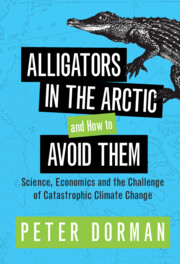 Alligators in the Arctic and How to Avoid Them
Alligators in the Arctic and How to Avoid Them When Alligators Go North
Published online by Cambridge University Press: 14 July 2022
The Paleocene-Eocene Thermal Maximum, which occurred 56 million years ago, saw semi-tropical temperatures – and alligators – well above the Arctic Circle. This was likely caused by very high concentrations of carbon dioxide in the atmosphere. Through the burning of fossil fuels, present-day people run the risk of recreating these catastrophic conditions. This book draws the implications of climate science for economics and policy. It welcomes the analytical clarity economics brings to the question of how to control carbon emissions, but it rejects the economic impulse to search for their “optimal” level. As for policy, it works backward from the conditions for avoiding a climate catastrophe rather than forward from what appears politically feasible at the current moment. Along the way it critiques several common assumptions: that policies should try to balance their economic costs and benefits, that the costs of stabilizing the climate will be modest and only the intransigence of the fossil fuel companies stands in the way, that climate change is not “really” about carbon but some deeper ideological problem and that the problem can be solved by actions individuals or organizations can take one at a time.
To save this book to your Kindle, first ensure [email protected] is added to your Approved Personal Document E-mail List under your Personal Document Settings on the Manage Your Content and Devices page of your Amazon account. Then enter the ‘name’ part of your Kindle email address below. Find out more about saving to your Kindle.
Note you can select to save to either the @free.kindle.com or @kindle.com variations. ‘@free.kindle.com’ emails are free but can only be saved to your device when it is connected to wi-fi. ‘@kindle.com’ emails can be delivered even when you are not connected to wi-fi, but note that service fees apply.
Find out more about the Kindle Personal Document Service.
To save content items to your account, please confirm that you agree to abide by our usage policies. If this is the first time you use this feature, you will be asked to authorise Cambridge Core to connect with your account. Find out more about saving content to Dropbox.
To save content items to your account, please confirm that you agree to abide by our usage policies. If this is the first time you use this feature, you will be asked to authorise Cambridge Core to connect with your account. Find out more about saving content to Google Drive.